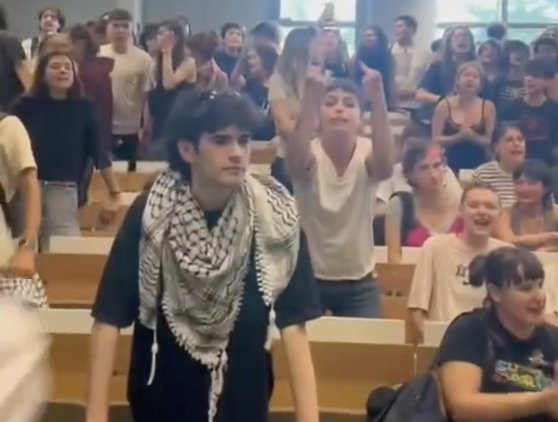TURIN – Pro-Palestinian protests at the Book Fair and University, the institutions condemned the violence

Tensions between pro-Palestinian activists and law enforcement marred the Salone Internazionale del Libro, Italy’s largest book fair, in Turin. On Thursday 15 May, activists attempted to storm the building during the launch of the book La cultura dell’odio. Media, università e artisti contro Israele (The Culture of Hatred. Media, University and Artists against Israel) by journalist Nathan Greppi (Lindau). Around 100 pro-Palestinian demonstrators gathered outside the Lingotto pavilions, which were guarded by a large police presence.
Police forces were also present inside the hall, as the event dedicated to Greppi’s book had been targeted by some student groups, who tried to stop it. Jewish Community President Dario Disegni and historian Claudio Vercelli were also due to participate. However, as publisher Ezio Quarantelli announced, “on the instructions of the police, they chose to abstain.” The meeting went ahead anyway: “By being here, we are defending democracy and the right to freedom of expression: an important space of freedom.
Pro-Palestinian irruption at the University
Tensions also unfolded at the University of Turin, where pro-Palestinian activists forced their way into the presentation of the National Manifesto for the Right to Study, which was supported by the Italian Union of Young Jews (UGEI), among others. The UGEI reported that the meeting was suspended because of “threats, jolts, spits, slaps, pins reaped off, and right of speech denied.” In a statement, the UGEI said that the university “cannot and should not become hostage to the violence perpetrated by a minority incapable of democratic confrontation with diverse ideas. When it happens, the very essence of the academic space is compromised.”
Italian Jewish communities on alert
The two pro-Palestinian demonstrations have alarmed the Jewish community. According to Noemi Di Segni, the President of the Union of Italian Jewish Communities, “a democratic country, a university venue or a book fair cannot host and legitimize those who, through violence and abuse, deny others the right to express their views in the name of an imaginary defense of rights and a pretense of democracy”. She added that “even with the support of law enforcement, security will never be guaranteed if every generation does not make the culture of coexistence their own, eliminating any prevarication and indifference”. The Jewish Community of Turin also expressed “deep concern about the climate of intolerance increasingly manifesting itself in university classrooms and places designated for the free exchange of ideas and opinions.
Turin’s mayor, Stefano Lo Russo, condemned the demonstrations. “What happened at the University of Turin and the Salone Internazionale del Libro is unacceptable: no protest should prevent a conference or book presentation,” he said. “Any condemnation of the politics of the government of the State of Israel or any expression of solidarity and vicinity to the Palestinian people have nothing to do with these episodes of abuse and violence.” According to Piedmont Region Council vice-president Domenico Ravetti, “we cannot limit ourselves to circumstantial indignation” because “there is a fanatical minority that thinks it can hold places of free thought hostage”.
In a statement, Bruno Gazzo, the president of the Italy-Israel Associations Federation, addressed Interior Minister Matteo Piantedosi, asking what measures he has taken or intends to take “to counter the growing antisemitism cleverly disguised as anti-Zionism by groups that openly support Hamas”, and asked the Minister for Universities, Anna Maria Bernini, “what measures she intends to take to guarantee the free expression of ideas in Italian universities.”
